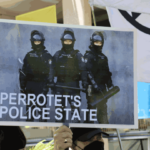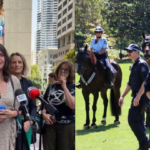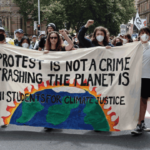Occupying Perrottet Over Coal Expansion: An Interview With Rising Tide’s Shaun Murray
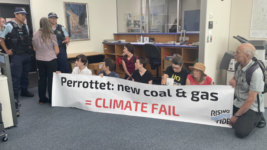
Rising Tide Australia occupied NSW premier Dominic Perrottet’s electoral office in Epping a week out from the NSW election. And the group of around 15 climate defenders, half of whom were high school students, took over the space with the aim of teaching the Liberal leader a lesson.
During the 45-minute occupation, 15-year-old, year 10 student Chris Black took the opportunity to teach Perrottet a preprepared lesson on the climate crisis and how to abate it, as well as recommending that people vote for a party or independent that’s prioritising action on climate.
“Clearly the premier doesn’t understand the science of climate change and why approving new coal and gas projects in 2023 is madness,” the school student told onlookers. “So, we’ve taken some time off school today to educate him about fossil fuels and the climate crisis.”
Indeed, in taking the nonviolent direct action, the Rising Tide activists were calling on fellow constituents to vote green and teal at the ballot. And for their troubles, ten of them were charged with trespass, with four adults being arrested and then taken to Ryde police station.
Guaranteeing destruction
Since the last state election, NSW has morphed into a frontline of climate-driven extreme weather events. In March 2019, the state was at the tail end of a severe years-long drought, the coming summer saw the entire eastern seaboard in flames, and 2022 was a year of unprecedented floods.
Yet, despite the understanding that the devastation resulting from these extreme weather events is caused by the use of fossil fuels, the NSW government is currently contemplating the largest coal expansion for this state since the 2015 Paris Agreement.
A Lock the Gate analysis released late last month reveals that if the eight new coal projects being considered are given the greenlight, they will result in an additional 1.5 billion tonnes of greenhouse gas emissions released into the atmosphere, which is 10 times the state’s emissions total for 2019.
The report makes clear that “the NSW Perrottet government’s policy of letting the coal mining sector charge full steam ahead without constraint fatally undermined its stated climate goals” and the state that’s about to go to the polls is “staring down the barrel” of a huge “climate bomb”.
Minutes to go
The IPCC just released its final report this decade, which outlines that human-caused climate change is now unequivocal, over 3 billion people are living in highly vulnerable circumstances because of it and that humanity needs “deep, rapid and sustained” cuts to limit rises to 1.5°C this decade.
Released on Tuesday, the IPCC synthesis report further explains that “some future changes are unavoidable and/or irreversible”, while every incremental increase in global warming has the potential to spark an escalation in the impacts on the planet.
Sydney Criminal Lawyers spoke to Rising Tide Australia spokesperson Shaun Murray about how the citizens of NSW should be voting this weekend in order to bring about climate action, the form of the current government in terms of tackling the issue and the ongoing misuse of bail conditions.
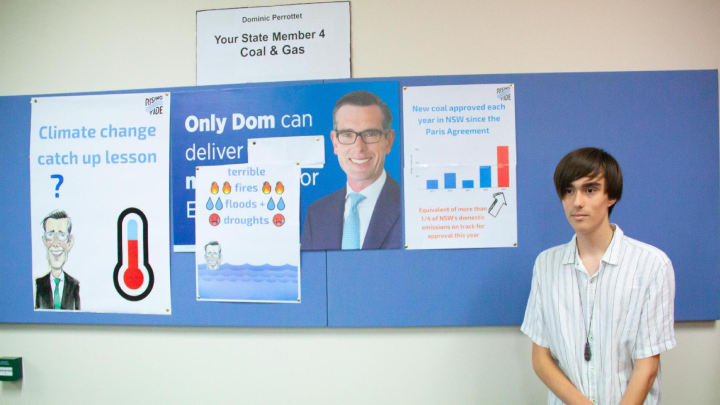
Shaun, you and around fourteen other Rising Tide activists took over NSW premier Dominic Perrottet’s electoral office in Epping last Friday. And on occupying his office 15-year-old school student Chris Black gave a “climate catchup lesson” he thought might benefit the Liberal leader.
So, how would you describe what happened on the day?
We did it because NSW is facing the largest coal expansion this year since the Paris Agreement, which is horrendous.
The premier doesn’t understand the scientific urgency of the climate crisis and why we need to be ruling out new fossil fuel projects, rather than allowing them to proceed.
So, that was the basis for the action.
Taking over the premier’s office for 45 minutes is a fairly drastic move. Why was it necessary?
I don’t think it’s drastic at all, to be honest. It’s fairly mild relative to the urgency and impacts of the climate crisis.
The final part of the IPCC report came out this morning. And it’s dire. It says the window to act is closing and we’re definitely not on track to hold warming to 1.5°C or even 2°C at this point.
The challenge for humanity is both urgent and dire, so the occupation of an electoral office is nothing.
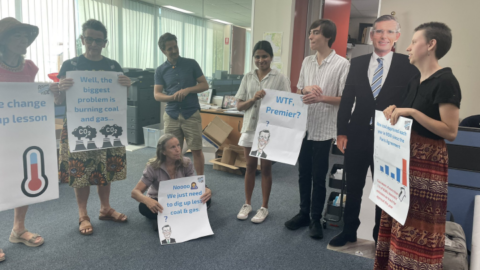
There has been a lot of talk around the way NSW police has been applying bail conditions to people arrested over climate actions. Four people involved in your demonstration were arrested, including yourself.
So, how were your interactions with police?
To clarify, we were all charged, and we weren’t given the opportunity to leave once police arrived.
I was charged and arrested. The others in the group were told they were going to be charged, and three of them decided to stay as they’d already been charged.
Did bail conditions come into the picture?
I had bail conditions imposed on the basis that if released from custody, there’s a concern that I will endanger the safety of the victims, which is quite a stretch.
I have never been seen or involved in any climate protest that’s intimidating, let alone violent.
We are explicitly a nonviolent and peaceful movement, so the idea that bail conditions can be imposed on the basis that we are a danger to the community is far-fetched.
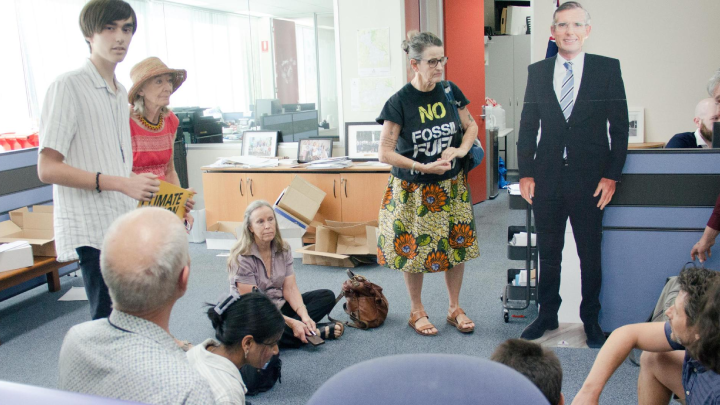
The Rising Tide action took place in the NSW premier’s office a week prior to the 25 March state election. This was no coincidence.
How would you describe the form of the 12-year-old Coalition government in this state in terms of action on climate?
They have done some positive things around renewable energy. And at times, Matt Kean has been a public advocate for climate. He was at odds with the Morrison government around this.
If you consider their record on domestic emissions, it’s not bad. New renewable projects are being built. Domestic coal-fired power is being phased out. But we can’t take that in isolation.
There has simultaneously been massive coal expansion for export. And to say that it’s someone else’s problem or it sits on someone else’s accounting or they’re solely responsible for producing the resulting emissions doesn’t fly, frankly.
That’s especially so when you have the International Energy Agency and the IPCC all warning that we have to stop fossil fuel projects immediately.
The coal projects that are on track to be approved this year in NSW represent more than a third of the state’s existing domestic emissions. And that’s in one year.
So, it’s kind of outrageous that they can claim any sort of climate credentials in that context.
What was the gist of the lesson that Rising Tide sought to teach the NSW premier?
It’s a lesson that a 15-year-old schoolboy has a much stronger grasp on than the premier, which is that we’re in a climate crisis and its extreme weather impacts are smashing communities and the state.
The extreme weather is causing massive issues around justice and it’s killing innocent people around the world every day.
That is the crisis that we are in, and allowing new fossil fuel projects to proceed is pouring petrol on that fire.
So, that’s the lesson.
And lastly, Shaun, with the NSW election coming up this weekend, how is Rising Tide advising people to vote? And do you hold much hope in the current system of government coming around to climate action?
Both the Coalition and Labor are in lockstep around new fossil fuel projects, which means they have nothing to say and apparently their policy is to allow business as usual.
So, I would tell voters, “If you care about the climate, don’t vote for either major party.”
The Greens, the teals and other independents have much better climate policies. So, people should vote for those other candidates and parties if they want actual action on climate.
A simple test of whether a party is worth voting for is whether it supports coal and gas projects. That is a simple test of climate action.
Then in terms of the system, it’s entirely conceivable that with the declining votes for both major parties that we will soon see ongoing minority governments, where a major will be forced into a coalition with the Greens, teals and other independents.
It’s at that point, when a minority government like this is formed, that we might see real action on climate change. That’s entirely conceivable.
But we should not be looking at a vote once every four years to save us. We need an active social movement to meet this crisis, which is why people should come to climate camp in Newcastle in April.



